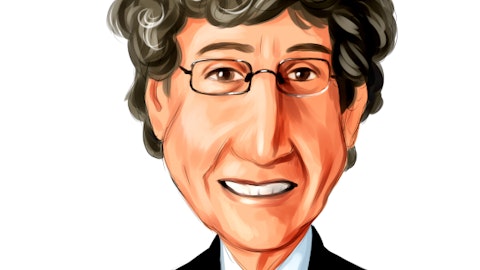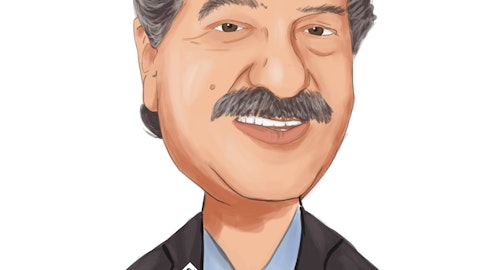I’d kind of look back, absent the pandemic, which I know is a giant shock to the system, that happened to be the point in time where we crossed $10 billion, and we had to work through a whole variety of things, including the scale to overcome the — amendment changes and things like that. We kind of feel like that’s behind us. And we are just going to now continue down the path of growing the customer base. But realistically, with our price discipline and our credit cut, we are not going to be growing at double digits this year. That will be closer to single digits. So I don’t know if that helps, but that’s a general outlook for us.
Michael Perito: Great. No, no, I appreciate all that context, Chris. Thanks guys for taking the question.
Christopher Maher: Thanks, Mike. Thank you.
Operator: Thank you. Our next question today comes from David Bishop from Hovde Group. David, please go ahead. Your line is open.
David Bishop: Hey, good morning, gentlemen.
Christopher Maher: Good morning, Dave.
David Bishop: Chris, or Joe, Slide 6, you break out the loan geographic distribution by region. As you look out in terms of the newer markets, the Boston and Baltimore, just curious maybe where you see that potentially growing as a percent of the pie over the next maybe 2 to 3 years or so? Do you think that gets to double digits here in the next 2 years?
Joe Lebel: I don’t know where the end game is because of the cloudiness as Chris referred to it, at least for ’23. But we are pretty happy with what they’ve done so far. I think Boston has got a little bit of a head start. They have a little bit of a larger team as we tend to do, we are always outlooking for seasoned successful bankers will continue to do that. And the Baltimore group is largely focused on the C&I space, whereas Boston has been largely focused in CRE. So it’s not easy to compare them. But if you look at the trajectory of what we did in Philadelphia and New York, I do think we have an opportunity to grow those meaningfully down the road. Some of that will be incumbent upon us to continue to fund them appropriately in this environment. So I do see really, they call it blue skies ahead, David. But I don’t know if it will be as rapid as the growth we’ve enjoyed infilling in New York in a really good environment.
David Bishop: Got it. And then I think maybe, Joe, during the you mentioned some opportunities on the construction segment. Maybe just to dive into that particular where you’re seeing some growth opportunities?
Joe Lebel: Sure. Well, you guys may recall that we started a construction vertical just a few years ago with the acquisition of a very talented banker has been in the space for 30 years, and we built out that team a bit. We really saw some significant activity in 2022. We actually did about triple the volume that we did in 2021. A lot of that, as you would expect, is undrawn because these are projects that are being built out. And so we do see that even if we were to slow activity in that space because of the uncertainty, these projects are going to fund and help us support some loan growth in that segment regardless. So we are pretty bullish there. And we are reinvesting there. We are again, we are very thoughtful, but we know the markets that we serve pretty well.
And as you all know, especially, we will use New Jersey as an example. It’s very difficult to get things approved. It takes 18 to 36 months to get things approved. When projects get approved, they get built and they get filled. So we are pretty bullish.




